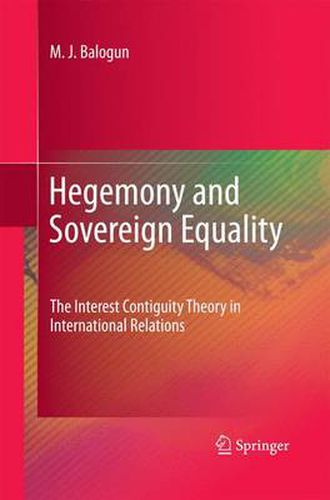Readings Newsletter
Become a Readings Member to make your shopping experience even easier.
Sign in or sign up for free!
You’re not far away from qualifying for FREE standard shipping within Australia
You’ve qualified for FREE standard shipping within Australia
The cart is loading…






This title is printed to order. This book may have been self-published. If so, we cannot guarantee the quality of the content. In the main most books will have gone through the editing process however some may not. We therefore suggest that you be aware of this before ordering this book. If in doubt check either the author or publisher’s details as we are unable to accept any returns unless they are faulty. Please contact us if you have any questions.
The interest contiguity theory, which is the book’s centerpiece, holds that rather than a smooth, one-way cruise through history, humankind’s journey from the inception to the present has brought him/her face to face with broadly three types of interests. The first is the individual interest, which, strange as it may sound, tends to be internally contradictory. The second is society’s (or national ) interest which, due to the clash of wills, is even more difficult than personal interest to harmonize. The third is the interest espoused to justify the establishment and maintenance of supranational institutions. Though conflicting, some interests are, due to their relative closeness (or contiguity), more easily reconcilable than others.
In tracing the links between and among the three broad types of interests, the book begins with a brief philosophical discussion and then proceeds to examine the implications of human knowledge for individual liberty. Against the backdrop of the epistemological and ontological questions raised in the first chapter, the book examines the contending perspectives on the theory of the state, and in particular, the circumstances under which it is justified to place the interest of society over that of the individual. The focus of the fourth chapter is on the insertion of the supranational governance constant in the sovereignty equation, and on the conflict between idealist and realist, and between both and the Kantian explanations for the new order. The adequacy or otherwise of the conflicting explanations of the change from anarchy to a ‘new world order’ is the subject taken up in the succeeding chapters. Besides suggesting a new analytical tool for the study of politics and international relations, the contiguity theory offers statespersons new lenses with which to capture the seismic, perplexing and sometimes disconcerting changes unfolding before their eyes.
$9.00 standard shipping within Australia
FREE standard shipping within Australia for orders over $100.00
Express & International shipping calculated at checkout
This title is printed to order. This book may have been self-published. If so, we cannot guarantee the quality of the content. In the main most books will have gone through the editing process however some may not. We therefore suggest that you be aware of this before ordering this book. If in doubt check either the author or publisher’s details as we are unable to accept any returns unless they are faulty. Please contact us if you have any questions.
The interest contiguity theory, which is the book’s centerpiece, holds that rather than a smooth, one-way cruise through history, humankind’s journey from the inception to the present has brought him/her face to face with broadly three types of interests. The first is the individual interest, which, strange as it may sound, tends to be internally contradictory. The second is society’s (or national ) interest which, due to the clash of wills, is even more difficult than personal interest to harmonize. The third is the interest espoused to justify the establishment and maintenance of supranational institutions. Though conflicting, some interests are, due to their relative closeness (or contiguity), more easily reconcilable than others.
In tracing the links between and among the three broad types of interests, the book begins with a brief philosophical discussion and then proceeds to examine the implications of human knowledge for individual liberty. Against the backdrop of the epistemological and ontological questions raised in the first chapter, the book examines the contending perspectives on the theory of the state, and in particular, the circumstances under which it is justified to place the interest of society over that of the individual. The focus of the fourth chapter is on the insertion of the supranational governance constant in the sovereignty equation, and on the conflict between idealist and realist, and between both and the Kantian explanations for the new order. The adequacy or otherwise of the conflicting explanations of the change from anarchy to a ‘new world order’ is the subject taken up in the succeeding chapters. Besides suggesting a new analytical tool for the study of politics and international relations, the contiguity theory offers statespersons new lenses with which to capture the seismic, perplexing and sometimes disconcerting changes unfolding before their eyes.